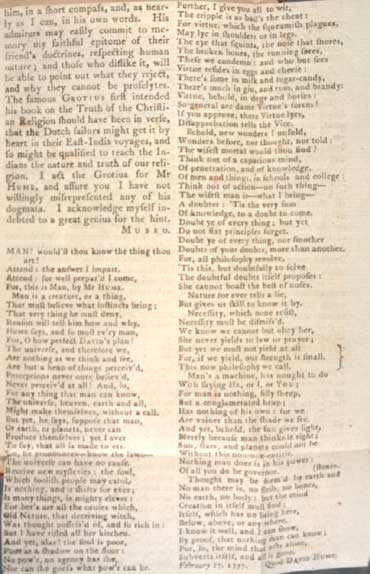|
To the EDITOR of the
CONSTITUTIONAL MISCELLANY.
SIR,
SOON after the death of Mr DAVID HUME, we had many a panegyric on the
historian and philosopher. His abilities, in both characters, have been
much celebrated: and yet his partialities and misrepresentations in history,
and his absurdities and contradictions in the science of human nature,
have been repeatedly pointed out, and no defence has been offered for
him, or by him; unless a cry against the reverend detector of his historical
faults, and against the eloquent unveiler of his philosophy, be considered
as defence. My business is not to applaud or condemn him: I mean to give
your readers the system of this extraordinary philosopher, as Bishop Warburton
names him, in a short compass, and, as nearly as I can, in his own words.
His admirers may easily commit to memory my faithful epitome of their
friend's doctrines, respecting human nature; and those who dislike it,
will be able to point out what they reject, and why they cannot be proselytes.
He famous GROTIUS first intended his book on the Truth of the Christian
Religion should have been in verse, that the Dutch sailors might get it
by heart in their East-India voyages, and so might be qualified to teach
the Indians the nature and truth of our religion. I act the Grotius for
Mr. HUME, and assure you I have not willingly misrepresented any of his
dogmata. I acknowledge myself indebted to a great genius for the hint.
MUSEO.
MAN! would'st thou know the thing thou art!
Attend: the answer I impart.
Attend: for well prepar'd I come,
For, this is Man, by MR HUME.
Man is a creature, or a thing,
That must believe what instincts bring;
That very thing he must deny,
Reason will tell him how and why.
HUME says, and so must ev'ry man,
For, O how perfect DAVID's plan!
The universe, and therefore we,
Are nothing as we think and see,
Are but a heap of things perceiv'd,
Perceptions never once believ'd,
Never perceiv'd at all! And, lo,
For any thing that man can know,
The universe, heaven, earth and all,
Might make themselves, without a call.
But yet, he says, suppose that man,
Or earth, or planets, never can
Produce themselves; yet I aver
To say, that all is made to err.
Lo, he pronounces - know the laws -
The universe can have no cause.
Receive new mysteries: the soul,
Which foolish people may extol,
Is nothing, and it shifts for ever;
In many things, is mighty clever:
For her's are all the causes which,
Old Nature, that deceiving witch,
Was thought posses'd of, and so rich in:
But I have rifles all her kitchen.
And yet, alas! The soul is poor,
Poor as ashadow on the floor:
No pow'r, no agency has she,
Nor can she guess what pow'r can be.
Further, I give you all to wit,
The cripple is as bad's the cheat:
For virtue, which the squeamish plagues,
May lye in shoulders or in legs.
The eye that squints, the nose that snores,
The broken bones, the running sores,
These we condemn: and who but sees
Virtue resides in eggs and cheese:
There's some milk and sugar-candy,
There's much in gin, and rum, and brandy:
Virtue, behold, in dogs and horses:
So general are dame Virtue's forces!
If you approve, there Virtue lyes,
Disapprobation tells the Vice.
Behold, new wonders I unfold,
Wonders before, nor thought, nor told:
The wisest mortal would thou find?
Think not of a capacious mind,
Of penetration, and of knowledge,
Of men and things, in schools and college:
Think not of action - no such thing -
The wisest man is - what I bring -
A doubter: 'Tis the very sum
Of knowledge, to a doubt to come.
Doubt ye of every thing; but yet
Do not fixt principles forget.
Doubt ye of every thing, nor smother
Doubts of your doubts, more than another.
For all philosophy revolve,
'Tis this, but doubtfully to solve
The doubtful doubts itself proposes:
She cannot boast the best of noses.
Nature for ever tells a lie,
But gives us skill to know it by.
Necessity, which none resist,
Necessity must be dismiss'd.
We know we cannot but obey her,
She never yields to law or prayer;
But yet we must not yield at all [three line bracket]
For, if we yield, our strength is small.
This now philosophy we call.
Man's a machine, has nought to do
With saying HE, or I, or YOU;
For man is nothing, silly sheep,
But a conglomerated heap;
Has nothing of his own: for we
Are vainer than the shade we see.
And yet, behold, the sun gives light,
Merely because man thinks it right;
Sun stars, and planets could not be
Withour this non-non-entitie.
Nothing man does is in his power:
Of all you do be governor.
Thought may be form' by earth and stones.
No man there is, no flesh, no bones,
No earth, no body: but the mind
Creation in itself must find;
Itself, which has no being here,
Below, above, or any where.
I know it well, and I can show,
By proof, that nothing man can know;
For, lo, the mind that acts alone,
Subverts itself, and all is gone.
February 17, 1777 Quod DAVID HUME.
* * * * * * * * * * * * * * *
Back
|
|


|

